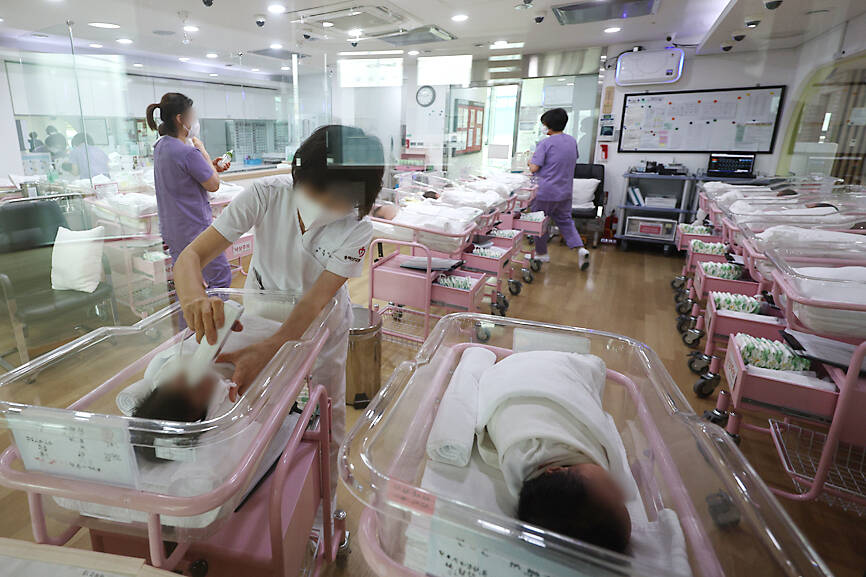South Korea’s fertility rate, already the world’s lowest, continued its dramatic decline last year, as women concerned about their career advancement and the financial cost of raising children decided to delay childbirth or not have babies.
The average number of expected babies for a South Korean woman during her reproductive life fell to a record low of 0.72 from 0.78 in 2022, data from Statistics Korea showed yesterday.
Neighboring Japan on Tuesday said that the number of babies born there last year fell for an eighth straight year to a fresh record low.

Photo: EPA-EFE / YONHAP
Japan’s fertility rate hit a record low of 1.26 in 2022, while South Korea’s is far below the rate of 2.1 per woman needed for a steady population and well behind the rate of 1.24 in 2015 when concerns about issues such as the cost of housing and education were lower.
Since 2018, it has been the only Organisation for Economic Co-Operation and Development (OECD) member with a rate below 1, defying the billions of dollars spent by the country to try to reverse the trend that led the population to decline for a fourth straight year last year.
South Korea also has the worst gender pay gap in the OECD, as South Korean women bring home about two-thirds of the income of men.
“Women typically can’t build on their experience to climb higher at workplaces because they are often ... the only one doing the childcare [and] often need to rejoin the workforce after extended leaves,” said Jung Jae-hoon, a social welfare policy professor at Seoul Women’s University.
“Having a baby is on my list, but there’s windows for promotions and I don’t want to be passed over,” said Gwak Tae-hee, 34, a junior manager at a South Korean dairy product maker who has been married for three years.
Gwak had considered starting in vitro fertilization treatment last year to try to have a baby, but ended up volunteering for work projects to improve her career prospects.
“I don’t know about elsewhere, but working two or three days a week doesn’t get you anywhere in Korean companies. I hope it’s not too late when I try next year or the year after,” Gwak said.
South Korea’s demographic crisis has become the top risk to economic growth and the social welfare system, with the country’s population of 51 million on track to halve by the end of this century.
South Korea has previously projected its fertility rate is likely to fall further to 0.68 this year. The capital, Seoul, which has the country’s highest housing costs, had the lowest fertility rate of 0.55 last year.

FREEDOM OF NAVIGATION: The UK would continue to reinforce ties with Taiwan ‘in a wide range of areas’ as a part of a ‘strong unofficial relationship,’ a paper said The UK plans to conduct more freedom of navigation operations in the Taiwan Strait and the South China Sea, British Secretary of State for Foreign, Commonwealth and Development Affairs David Lammy told the British House of Commons on Tuesday. British Member of Parliament Desmond Swayne said that the Royal Navy’s HMS Spey had passed through the Taiwan Strait “in pursuit of vital international freedom of navigation in the South China Sea.” Swayne asked Lammy whether he agreed that it was “proper and lawful” to do so, and if the UK would continue to carry out similar operations. Lammy replied “yes” to both questions. The

‘OF COURSE A COUNTRY’: The president outlined that Taiwan has all the necessary features of a nation, including citizens, land, government and sovereignty President William Lai (賴清德) discussed the meaning of “nation” during a speech in New Taipei City last night, emphasizing that Taiwan is a country as he condemned China’s misinterpretation of UN Resolution 2758. The speech was the first in a series of 10 that Lai is scheduled to give across Taiwan. It is the responsibility of Taiwanese citizens to stand united to defend their national sovereignty, democracy, liberty, way of life and the future of the next generation, Lai said. This is the most important legacy the people of this era could pass on to future generations, he said. Lai went on to discuss

AMENDMENT: Climate change is expected to increase the frequency of high-temperature days, affecting economic productivity and public health, experts said The Central Weather Administration (CWA) is considering amending the Meteorological Act (氣象法) to classify “high temperatures” as “hazardous weather,” providing a legal basis for work or school closures due to extreme heat. CWA Administrator Lu Kuo-chen (呂國臣) yesterday said the agency plans to submit the proposed amendments to the Executive Yuan for review in the fourth quarter this year. The CWA has been monitoring high-temperature trends for an extended period, and the agency contributes scientific data to the recently established High Temperature Response Alliance led by the Ministry of Environment, Lu said. The data include temperature, humidity, radiation intensity and ambient wind,

SECOND SPEECH: All political parties should work together to defend democracy, protect Taiwan and resist the CCP, despite their differences, the president said President William Lai (賴清德) yesterday discussed how pro-Taiwan and pro-Republic of China (ROC) groups can agree to maintain solidarity on the issue of protecting Taiwan and resisting the Chinese Communist Party (CCP). The talk, delivered last night at Taoyuan’s Hakka Youth Association, was the second in a series of 10 that Lai is scheduled to give across Taiwan. Citing Taiwanese democracy pioneer Chiang Wei-shui’s (蔣渭水) slogan that solidarity brings strength, Lai said it was a call for political parties to find consensus amid disagreements on behalf of bettering the nation. All political parties should work together to defend democracy, protect Taiwan and resist